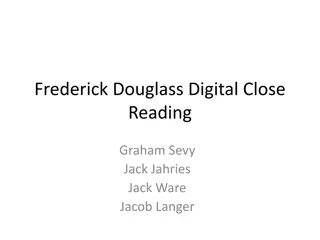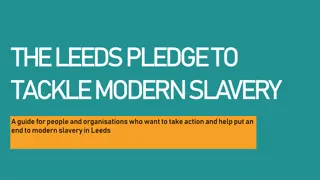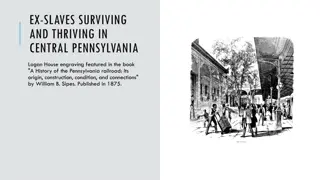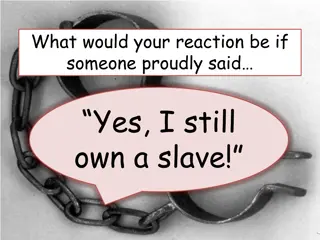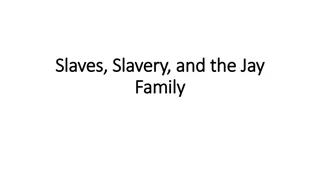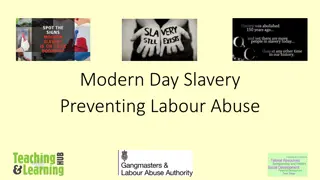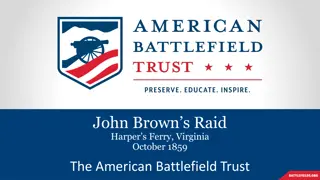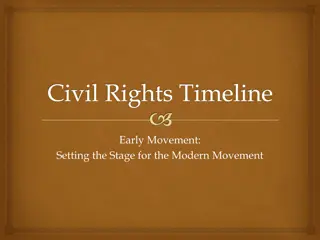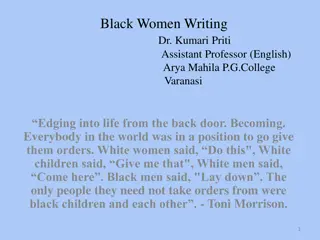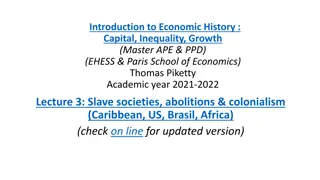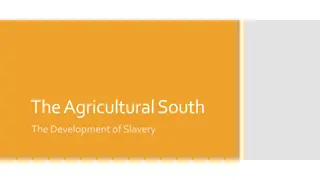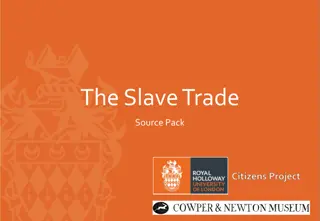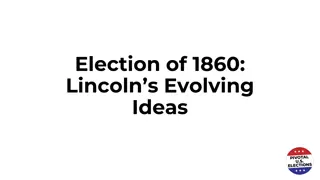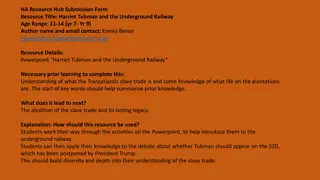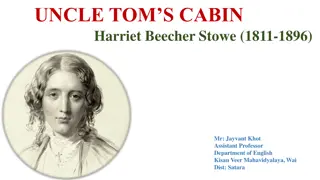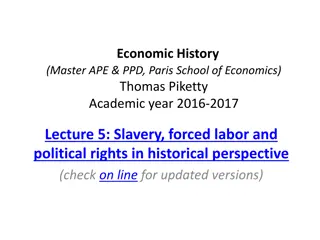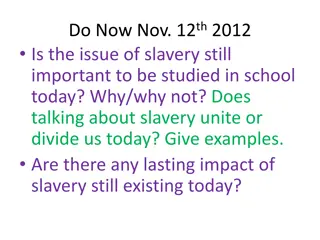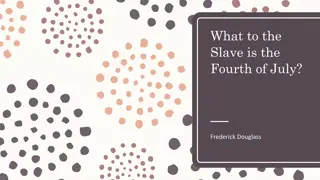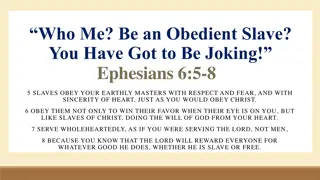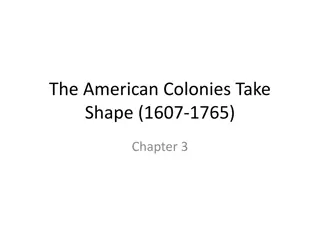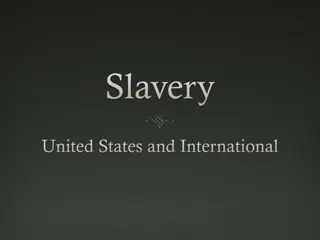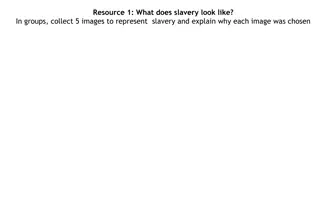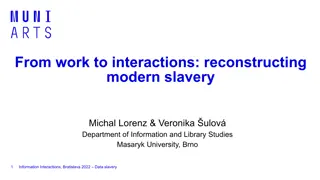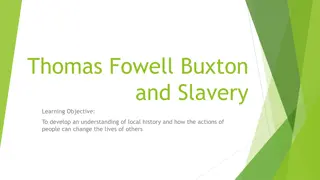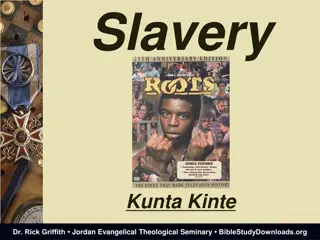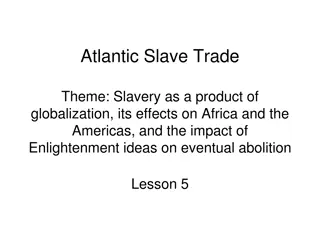Reflections on Slavery: Frederick Douglass's Inner Turmoil
Within close proximity to the Chesapeake Bay, Frederick Douglass experiences a profound internal conflict while observing ships - symbols of freedom to some, but haunting ghosts to him. His longing for freedom, juxtaposed with the realities of his enslaved existence, is vividly portrayed through his
0 views • 16 slides
Guide to Tackling Modern Slavery in Leeds
The Leeds Pledge to Tackle Modern Slavery offers a comprehensive guide for individuals and organizations in Leeds to combat modern slavery effectively. Launched on Anti-Slavery Day, this guide covers key sections like Recognize, Report, Support, Prevent, and Raise Awareness, providing information, r
0 views • 33 slides
History of Slavery in Central Pennsylvania and the Stories of Ex-Slaves
Explore the history of slavery in Pennsylvania and central PA, including the loss of voting rights for black men, the origins of former slaves in the region, their journey to central PA, involvement in the Civil War, occupational pursuits, participation in politics, entertainment activities, and sup
1 views • 29 slides
Understanding Toni Morrison's Beloved: An Exploration of Slavery's Legacy
Beloved, a novel by Toni Morrison, delves into the repercussions of slavery through the haunting tale of Sethe, a former slave who grapples with her past and motherhood. Set in post-Civil War America, the story intertwines themes of love, family, and self-possession in a poignant narrative that ques
0 views • 12 slides
The Era of Good Feelings and Westward Expansion in Early 19th Century America
The Era of Good Feelings (1817-1823) marked a period of national unity and political agreement in the United States, leading to a focus on expansion and development. This era saw significant diplomatic achievements and a surge in westward migration, particularly to areas like the Old Northwest and O
0 views • 19 slides
Jeremy Bentham and Utilitarianism: A Vision for Social Reform
Jeremy Bentham, a prominent philosopher of the 18th and 19th centuries, advocated for utilitarianism, which states that the greatest happiness of the greatest number should be the measure of right and wrong. He proposed the concept of the Panopticon as a new mode of obtaining power over individuals.
2 views • 13 slides
The Journey to Abolishing Slavery: Understanding William Wilberforce & the Movement
Discover the historical context of slavery, the pivotal role of William Wilberforce, and the reasons behind Britain's decision to abolish the slave trade in 1807. Explore key events, debates, and societal shifts that led to the abolition movement, shedding light on the complexities and motivations i
0 views • 9 slides
Exploring Slaves, Slavery, and the Jay Family History
Delve into the historical narrative surrounding slaves, slavery, and the Jay family in this informative collection. The images depict various aspects of this historical context, offering a glimpse into the past and shedding light on significant events and relationships. Learn about the intricacies o
0 views • 9 slides
Understanding Modern Day Slavery and Labor Exploitation
Explore the concept of modern slavery, its various forms, how it operates, signs to recognize, and where it can be found. Delve into the impact on individuals and society, and learn about initiatives like the GLAA's efforts to combat such abuses.
3 views • 13 slides
The Impact of John Brown's Raid on Harper's Ferry in 1859
John Brown's raid on Harper's Ferry in 1859 was an attempt to incite a slave rebellion and abolish slavery. Brown believed in the righteousness of his cause, but his actions sparked national debate and differing reactions. While some saw him as a martyr for freedom, others viewed him as a radical ex
2 views • 9 slides
Early Civil Rights Movement: Abolition, Legislation, and Freedom
Abolitionist groups form to fight against slavery in 1775, leading to the establishment of the Pennsylvania Society for Promoting the Abolition of Slavery. Legislation such as the Slave Trade Act of 1794 and the outlawing of slavery by different states played a crucial role in the early civil rights
0 views • 58 slides
Struggles of Black Women Against Racism and Oppression in America
The institutionalization of black slavery in America created a deep divide between whites and blacks. Racism ingrained in American history perpetuated the belief of black inferiority. Despite racial discrimination, black communities formed a strong identity post-abolition. Black women faced intense
0 views • 18 slides
Understanding the History of Slavery: Activities and Insights
Explore the historical context of slavery through various activities like mind mapping life in Africa, understanding European trade, depicting reasons for Africans chosen for slavery, learning about slave trading events, and delving into the experiences at Elmina Castle. Engage with visual content a
2 views • 12 slides
Development of Milk Production in Europe Post-Quota Abolition
The presentation evaluates challenges and opportunities for the EU dairy sector following the abolition of milk quotas in Europe. It reviews policy developments, context, structure, and functioning of the dairy sector. With insights from official data sources and consultation with key industry playe
0 views • 14 slides
Supporters of Slavery in the 19th Century: Legal, Religious, and Economic Arguments
In the 19th century, defenders of slavery utilized legal arguments by denying citizenship rights to blacks, religious arguments by justifying ownership and guidance through biblical references, and economic arguments by comparing treatment of slaves in the South to conditions of workers in the North
0 views • 4 slides
Slave Societies, Abolitions, and Colonialism: Economic History Overview
Explore the impact of slavery, abolition movements, and colonialism on economic structures in societies such as Britain, France, the USA, Brazil, Africa, and the Caribbean. Delve into the nuances of slave societies, the abolition process, extreme inequality, colonial finances, and decolonization in
0 views • 43 slides
Development of Slavery and Cotton Economy in the Agricultural South
The development of slavery and the rise of the cotton industry in the Agricultural South played a crucial role in shaping the region's economy and society. From the introduction of crops like tobacco, rice, and indigo to the emergence of cotton as a dominant crop supported by innovations such as the
0 views • 20 slides
The Slave Trade Source Pack and Key Information
Explore the history of the slave trade, key terminology, primary sources, and influential figures like John Newton, William Wilberforce, Mary Prince, and Olaudah Equiano. Learn about the Triangular Trade, Middle Passage, and the impact of the Industrial Revolution. Discover how abolition was achieve
0 views • 34 slides
Election of 1860: Lincoln's Changing Views on Slavery and Federal Authority
The election of 1860 marked a turning point, leading to secession of states and the start of the Civil War. Abraham Lincoln initially pursued a moderate stance on slavery to keep states in the Union. His evolving ideas on liberty, equality, and government are reflected in his speeches. The outcome s
0 views • 10 slides
Veganmodernism: The Future of Meat Abolition and Technological Disruption
Explore the vision of Veganmodernism for meat abolition, the shifting technology landscape, the current and future costs and impacts of animal products, and the projected peak in global meat production. Delve into a future where modern food products outshine animal-derived foods both in quality and
0 views • 26 slides
Harriet Tubman and the Underground Railroad Presentation
Explore Harriet Tubman's courageous efforts on the Underground Railroad through an interactive PowerPoint, fostering understanding of slavery, abolition, and Tubman's legacy. Engage students in discussions about Tubman's impact on U.S. history and her potential appearance on the $20 bill.
0 views • 11 slides
Uncle Tom's Cabin: Overview of Harriet Beecher Stowe's Abolitionist Novel
Harriet Beecher Stowe, an American abolitionist and author, penned "Uncle Tom's Cabin" to vividly portray the experience of slavery. The novel revolves around Uncle Tom, a dignified slave, and exposes the harsh realities of slavery in the 19th century America. It gained immense popularity, especiall
0 views • 55 slides
Historical Perspective on Slavery: Impact and Relevance
Explore the historical context of slavery, from Ancient Greece and Rome to the pre-1860 Southern US, and its long-term implications on societies. Delve into the debates on compensation, racial discrimination, and the comparison with debt and serfdom, shedding light on the continuum between slavery a
0 views • 51 slides
Relevance of Studying Slavery in Modern Education
The issue of slavery remains significant in modern education as it explores its impact on society, unity, and division. Discussing slavery can both unite and divide us today, with lasting impacts evident in various aspects of society. The historical context, including events like Nat Turner's Rebell
0 views • 17 slides
Enlightenment Philosophes and Their Revolutionary Ideas
Enlightenment philosophes such as Montesquieu, Condorcet, Voltaire, John Locke, Diderot, and Cesare Beccaria came from diverse backgrounds but shared a common desire to change the world. They advocated for freedom of expression, rational criticism, religious tolerance, separation of powers, educatio
0 views • 16 slides
Frederick Douglass: What to the Slave is the Fourth of July?
Frederick Douglass delivers a poignant speech on the Fourth of July, exposing the hypocrisy of America celebrating freedom while denying it to slaves. He challenges the nation to confront the injustices of slavery and calls for true equality and justice. Despite the grim reality he presents, Douglas
0 views • 4 slides
Reconstruction Period after the Civil War: Plans and Challenges
The Reconstruction period after the Civil War in the United States saw various plans proposed by President Abraham Lincoln, Republicans in Congress, President Andrew Johnson, and Radical Republicans. These plans aimed to rebuild the country and bring the Southern states back into the Union, addressi
0 views • 7 slides
Understanding Slavery in Biblical Context: A Different Perspective
Exploring the nuances of slavery as depicted in the Bible, this content delves into the context of slavery in ancient times, contrasting it with the more widely known American slavery. It highlights the mutual submission between masters and slaves, emphasizing the importance of good actions and atti
0 views • 22 slides
The Radical Phase of the French Revolution
Strong reactions in neighboring countries sparked the radical phase of the French Revolution, leading to the establishment of the First French Republic. The Jacobin party, sans-culottes, and Reign of Terror are significant events during this period, marked by the execution of Louis XVI and the pursu
0 views • 5 slides
Safeguarding Forum on Modern Day Slavery in Newham - May 6th, 2022
The Safeguarding Forum scheduled for May 6th, 2022, in Newham focuses on modern-day slavery, featuring discussions on strategies, action plans, and a zero-tolerance approach. The event includes insights from key speakers, updates on education safeguarding, and pathways for help and support for child
0 views • 30 slides
Understanding Modern Slavery Awareness for Private Landlords
Modern slavery awareness is crucial for private landlords to identify and combat various forms of exploitation such as forced labor, human trafficking, and domestic servitude that victims may endure. This article discusses the signs, risks, and legal implications associated with modern slavery in pr
0 views • 7 slides
Immigration and Slavery in the American Colonies (1607-1765)
The American colonies experienced significant immigration, with English, Irish, and German settlers seeking a new beginning. Many English immigrants were indentured servants, while Irish and German immigrants faced push factors like war and religious persecution. Additionally, the slave trade played
0 views • 42 slides
Overview of Legal Philosophy and Civil Rights Amendments
Understanding various legal philosophies such as natural law, legal positivism, legal realism, legal process, and critical legal studies, this content delves into the historical context of civil rights amendments, including the 13th, 14th, and 15th Amendments. It discusses significant cases and prov
0 views • 194 slides
The Story of Nat Turner: From Childhood to Rebellion
Born in 1800, Nat Turner experienced a traumatic childhood marked by slavery and visions from God. Raised in a religious family, he had a deep-seated hatred for slavery. Turner's rebellion in 1831 led to the deaths of many, as he sought to overthrow the oppressive system. His army of 70 slaves wreak
0 views • 16 slides
History of Slavery in the United States and Internationally
Slavery in the United States and internationally has a complex history, starting in the colonies with indentured servants and evolving into harsh chattel slavery. The Triangle Trade enriched Europeans at the expense of enslaved Africans, leading to a brutal system that destroyed families and culture
0 views • 8 slides
Exploring Modern Slavery Through Case Studies
This collection of case studies delves into modern forms of slavery, highlighting efforts to combat exploitation and abuse in different regions and sectors. From Brazil's innovative anti-slavery system to the struggles and successes of indigenous communities and worker coalitions, these narratives s
0 views • 6 slides
Unraveling Modern Slavery in Data Interactions
Explore the concept of data slavery through ethical concerns, research objectives, methodology, and the impact on society. Discover the various terms associated with data slavery and its ethical implications in the digital age.
0 views • 11 slides
Thomas Fowell Buxton: A Local Hero's Impact on the Abolition of Slavery
Discover the inspiring story of Thomas Fowell Buxton, a key figure in the abolition of slavery in the British Empire. Explore his life, achievements, and lasting legacy through monuments like Belfield House and the Buxton Monument on Bincleaves Green in Weymouth.
0 views • 10 slides
Understanding the History and Impact of Slavery in Ancient Societies
Delve into the origins, forms, and implications of slavery in ancient societies, exploring diverse aspects such as treatment of slaves, legal frameworks, and philosophical perspectives. Discover how slavery shaped social structures and human perceptions throughout history.
0 views • 56 slides
The Atlantic Slave Trade: Impact and Abolition
Slavery in Africa, fueled by Bantu migrations, led to a system where slaves had no rights but were crucial for wealth and power. The Islamic and European slave trades further exploited Africans, with the latter expanding significantly with the arrival of Europeans in the Americas. Portuguese slave t
0 views • 50 slides
